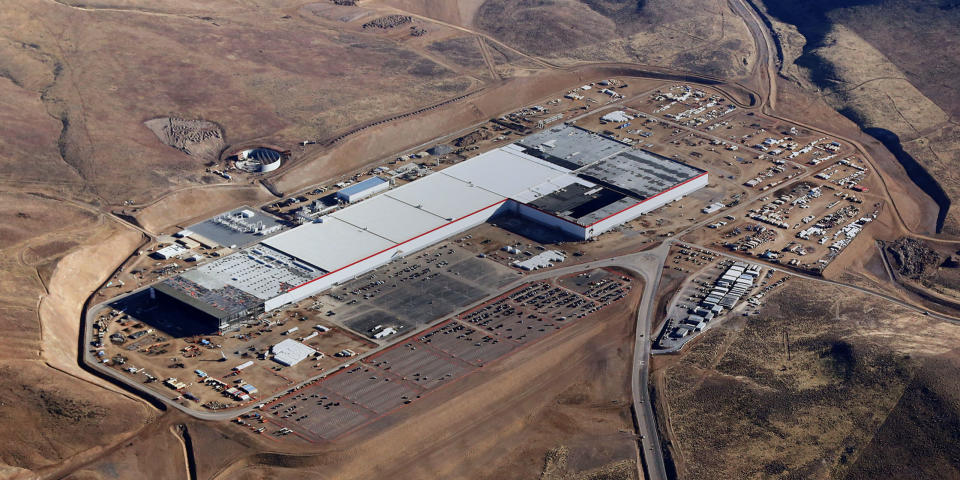Donald Trump and Elon Musk's views on US manufacturing could be a big win for Tesla
When it comes to American manufacturing, Donald Trump may have found an unlikely ally: Elon Musk.
Musk, who has made a name as one of Silicon Valley’s most aggressive visionaries on the future of driving, the future of energy, and the future of space exploration, is making a bold bet on US manufacturing.
The gigafactory, a massive new facility Musk’s company Tesla (TSLA) is building in the Nevada desert, is a $5 billion bet on the future of manufacturing the lithium ion batteries that power Tesla’s electric cars. This week, it was reported Tesla would invest an additional $350 million in the facility and hire 500 more workers.

And in a note to clients published Thursday, Morgan Stanley analyst Adam Jonas thinks this gigafactory — and Musk’s vision for “Gigamerica” — is a positive not only optically, but in fact improves the investment case for Tesla.
“Tesla stands at the epicenter of US high tech manufacturing job creation which may benefit more than just symbolically under the new administration,” Jonas writes.
Because if there’s one American business trend that Trump’s pledge to “Make America Great Again” is really about, it is creating manufacturing jobs in the US.
“Tesla employs 25,000 in the United States,” Jonas adds. “Elon Musk has an important line of communication to Donald Trump through his role as a strategic advisor to the President-elect. This strategic relationship between Tesla leadership and the new administration is an important development.”
Jonas highlighted this relationship inside of a note in which he upgraded his rating on shares of Tesla to “Overweight” from “Equal Weight” while raising his price target on shares to $305. In early trade on Thursday, Tesla shares were trading near $245.
Other positives for Tesla backing Jonas’ calls include an earlier launch of its new Model 3, the auto market starting to really back electric vehicles, and the seeming lack of momentum from tech companies like Alphabet (GOOGL) and Apple (AAPL) to build their own electric cars on any kind of reasonable timeline.

In recent weeks, we’ve seen automakers including Ford (F), Fiat Chrysler (FCAU), and General Motors (GM) announce investments in plants in the US. These have been near-term political wins for Trump, who has touted these announcements on Twitter.
But in our 2016 chart of the year, we detailed how manufacturing jobs have been hurt not just by Trump’s favorite “job takers” in Mexico and China, but by increased efficiencies in manufacturing processes. This signals that a large part of the loss in manufacturing jobs isn’t due to globalization, but automation.
Musk’s bet on US manufacturing, however, isn’t just bigger than what’s been announced recently by Tesla’s rivals, but paints a grand vision for the auto industry at large. Tesla is currently the leader in electric vehicles, and is hoping to make a breakthrough in more affordable cars with the release of its $35,000 Model 3 either late this year or early next year. (Tesla’s existing Model S and Model X cars often cost north of $70,000.)
The company is also a leader in the self-driving car space, with existing Tesla’s using autopilot to create not exactly self-driving but certainly something like “augmented driving.” This, in Musk’s view, and the view of many in the auto industry, is the future.
And if you want to take the Musk vision wholesale, one can see the path towards an argument that if Henry Ford and American manufacturing defined the first century of automobiles, Elon Musk and American manufacturing have a chance to define the second century of cars.
But for the Trump administration to make a meaningful difference to the company, it need not buy a vision this grand.
Recall that Tesla recently acquired Musk-run clean energy company SolarCity. The solar-powered energy space has long been dependent on government subsidies and the Trump administration seeing Musk as a partner in “making America great” could keep many of these programs in place.

Tesla has also gotten generous tax breaks from Nevada for locating the gigafactory in the state, and one imagines something like this template could feature as part of a bigger push from Trump to get manufacturing investments made back in the US again.
Musk and Tesla are certainly well-positioned to leverage their similar views on US manufacturing into a positive — and, investors probably hope, profitable — relationship with the Trump administration.
The most important thing for Tesla and Elon Musk, however, will be hoping that Donald Trump sees what’s in it for him, too.
—
Myles Udland is a writer at Yahoo Finance. Follow him on Twitter @MylesUdland
Read more from Myles here:
